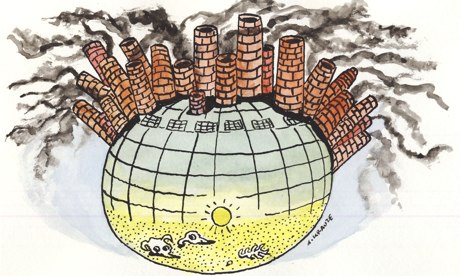Would you enjoy the cosiness and warmth of Christmas with your children or grandchildren just that little bit less if you knew that other people’s children were dying because of it? More than four million children under five years old are now at risk of acute malnutrition in the Sahel, an area of the world that is one of the clearest victims of the rich world’s addiction to fossil fuels.
About 18 million people in the Sahel – the vulnerable pan-African strip of land that runs from Senegal to Sudan along the southern edge of the Sahara – faced famine last year. Life has never been easy there. Its land is poor. Its people are often semi-nomadic, moving their animals between the grasslands. But science is increasingly pointing a hard finger at those to blame for the persistence of Sahelian drought – and it is us.
This is an ineluctable consequence of improving the computer models of climate change. Of course, there are still large uncertainties. But what has long persuaded me of the strength of the scientific case for human-induced climate change is that climate-sceptic scientists have not managed to build a model that explains global warming without human-induced effects. The human hand is indispensable in understanding what has happened.
There are legitimate doubts about the scale of the impact, and about other offsetting factors that may reduce human-induced global warming. But what should be a wake-up call is science’s growing ability to highlight the blame for particular extreme events, and not just in the Sahel.
For instance, a recent paper by Fraser C Lott and colleagues examined the increased probability that the 2011 East African drought in Somalia and Kenya can be attributed to human-induced climate change. Pardeep Pal and others investigated the impact of climate change on the £1.3bn insured losses from the flooding in the UK in 2000. Peter A Stott and others looked at the hot European summer of 2003, and its heatwave-related deaths.
Richard Washington, the professor of climate science at Oxford, rightly highlights the importance of this scientific work for its ability to change the global political and legal game. We saw how high feelings run with the walk-out by 132 developing countries at the Warsaw climate-change talks last month when the new Australian government tried to block all talk of loss and compensation until after 2015.
The more certain is the attribution for blame, the more justified many developing countries will feel in protesting about the impact of rising sea levels on small island states such as the Maldives and Fiji or low-lying delta cultures such as Vietnam and Bangladesh. Moreover, fair-minded democracies will find the call for compensation hard to resist at home.
The science also opens up the possibility that the victims of climate change could begin to take international legal action against the countries responsible, particularly the early industrialisers, such as Britain, Belgium and Germany, whose carbon continues to warm the planet a century after it was emitted. Legal action is not a substitute for politics, but it could highlight the evidence in an uncomfortable way.
This year a group of small island states threatened by rising sea levels, led by Palau, came close to asking the International Court of Justice for an advisory opinion on the responsibility of historic emitters for global warming. The main reason they did not press ahead then was that the scientific case is strengthening by the month. A later case will be even stronger.
“There will definitely be a case in my lifetime and probably within five to 10 years,” says Philippe Sands QC, the UCL professor of international law, who has advised many endangered nations, including Bangladesh. “It is going to happen. The only questions now are where, how and to what purpose.”
The UN framework may not be ideal, precisely because it is dominated by the historic five powers, all of whom have their own interests. But the Hamburg-based International Tribunal for the Law of the Sea may be a forum that would hear the matter.
Sands points out that climate change is already entering indirectly into cases such as the dispute between India and Bangladesh over territorial waters: as land disappears, so the projection of the line into the sea, dividing territorial waters, will change.
It is not a defence that we did not know what we were doing, nor does a case have to target everyone who might have historic responsibility: countries are jointly and severally liable, which may help to deal with the problem that the United States is often not a signatory and hence denies international jurisdiction.
Paradoxically, one of the strongest cards that the historic emitters can play is to highlight the international effort to tackle climate change. Legally, they can argue that the global process under way since 1992 through the Kyoto Protocol and the countless meetings of the “convention of the parties”, is itself a response to the need for action, and displaces the need for lawsuits.
But that implies that the global political process must hold out – as it can and should – a real possibility of delivering change. If it fails, the historic emitters may want to consider some of the consequences, not least of which is the possibility that embarrassing legal cases will display the increasingly strong scientific evidence about who is to blame.
http://www.theguardian.com/commentisfree/2013/dec/29/poorer-countries-climate-change-case?CMP=twt_fd
.
.
.


